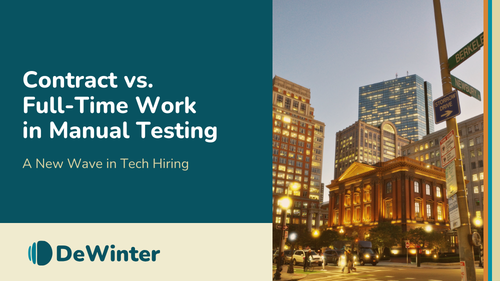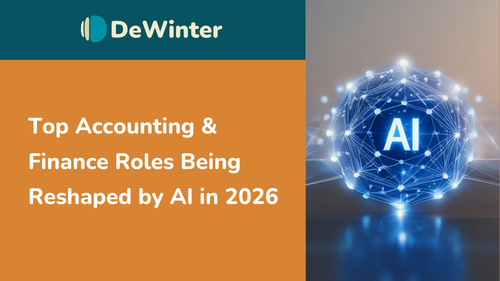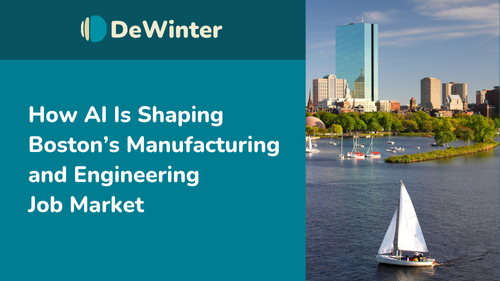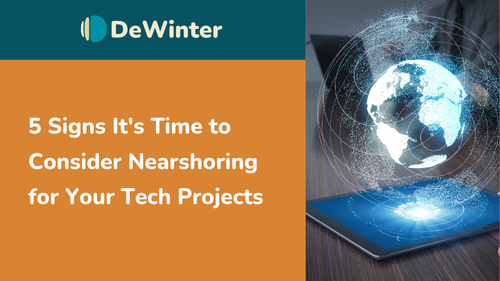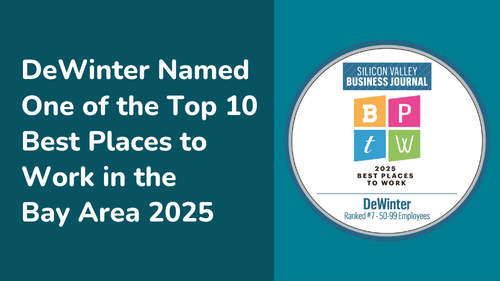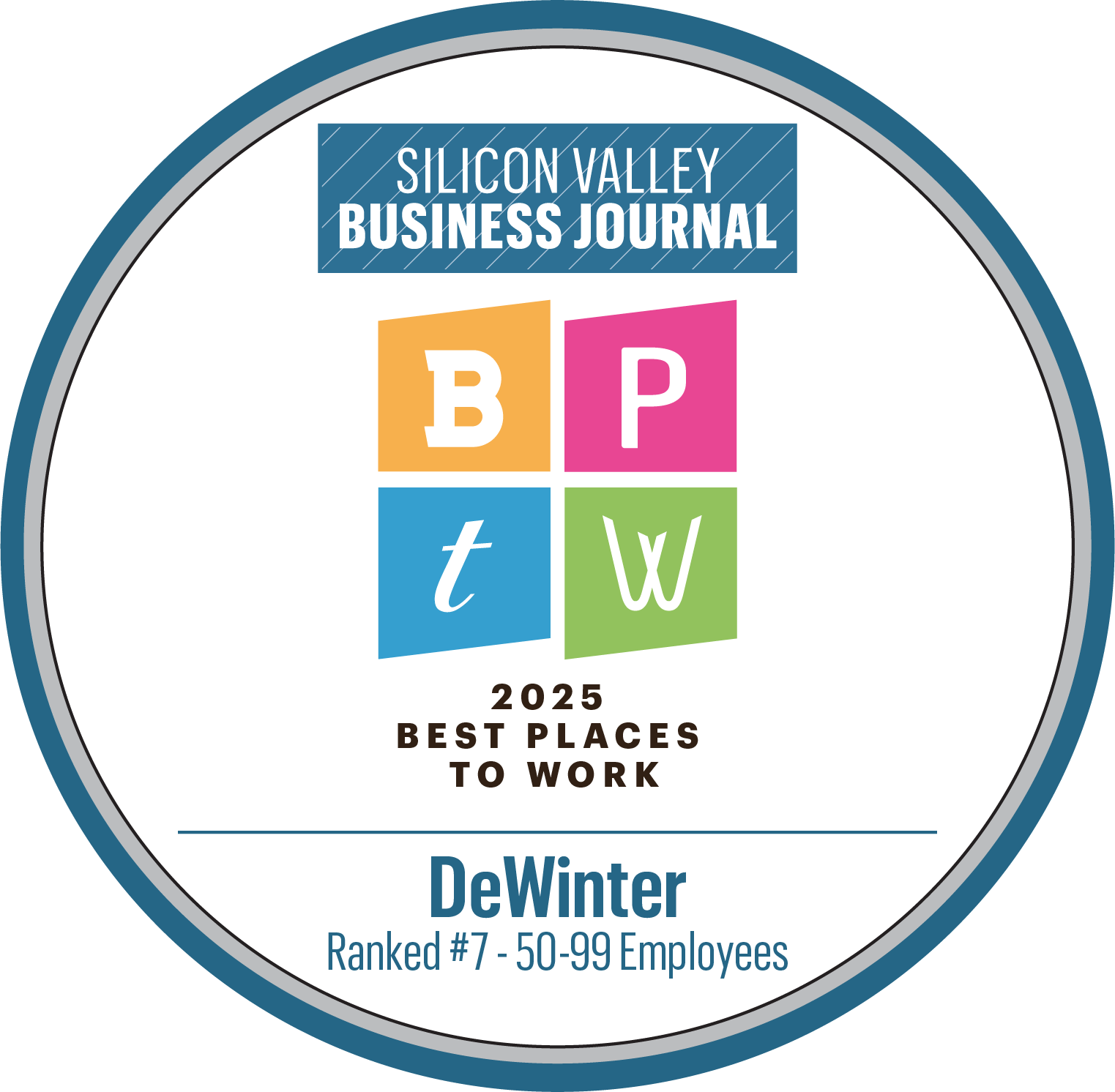How to Stand Out as an AI Engineer in a Competitive Job Market
The AI revolution is here, driving tremendous demand for skilled AI engineers. This escalating demand means increased competition. Whether you're a recent graduate or a seasoned professional, you need to stand out in today's dynamic AI job market.
This blog offers actionable advice to help you get hired and advance your AI career, highlighting how DeWinter can be a valuable partner.
The Booming Demand: Why Standing Out Matters
AI jobs are on a steep upward curve. The U.S. Bureau of Labor Statistics projects software developer employment, highly relevant to AI engineering, to grow by 17.9% from 2023 to 2033, translating to an estimated 303,700 new jobs. As of Q1 2025, AI-related positions in the U.S. alone saw a 25.2% increase from Q1 2024. Companies need strategic thinkers who can translate research into tangible business value. A degree isn't enough; you must demonstrate innovation, adaptability, and delivery.
What AI Job Titles Should You Look For?
The AI field is expanding rapidly, creating a diverse range of specialized roles. Beyond the general title of "AI Engineer," understanding the specific responsibilities of each position is crucial for tailoring your resume and career path. To help you navigate this complex landscape, the table below breaks down some of the most common AI job titles and their primary focuses, from developing models to advancing cutting-edge research.
| AI Job Title | Primary Focus | Key Responsibilities |
|---|---|---|
| Machine Learning Engineer | Building, deploying, and maintaining ML models in production environments. | Develop scalable ML systems, write clean code, and integrate models into applications. |
| Data Scientist | Analyzing and interpreting complex data to extract insights and inform business strategy. | Build predictive models, perform statistical analysis, and present findings to stakeholders. |
| AI Researcher | Developing new algorithms and theoretical models to advance the field of AI. | Conduct experiments, publish research papers, and stay current with academic literature. |
| Computer Vision Engineer | Designing and implementing systems that allow computers to interpret and understand visual data. | Develop image recognition and object detection models, and work with video data. |
| Natural Language Processing (NLP) Engineer | Building systems that can understand, generate, and interact with human language. | Create tools for text analysis, sentiment analysis, and conversational AI (chatbots). |
| AI Product Manager | Defining the strategy and roadmap for AI-powered products. | Bridge the gap between technical teams and business goals, and prioritize product features. |
Getting Started on Your AI Engineering Job Search
Once you've defined which AI job titles best fit your skills and preferences, how do you create a strategic approach to your job search? The following sections offer a comprehensive guide, from building a standout portfolio to mastering the interview, giving you a clear roadmap to success.
1. Build a Project-Backed Portfolio
Your portfolio is your most powerful tool. It showcases your practical skills, problem-solving abilities, and passion for AI.
- Open Source Contributions: Contribute to open-source AI projects. This shows initiative, collaboration skills, and familiarity with industry standards.
- GitHub as Your Digital Resume: Treat your GitHub profile as a professional portfolio.
- Showcase diversity: Include projects across various AI domains (e.g., Computer Vision, NLP, Reinforcement Learning, Generative AI).
- Real-world problems: Focus on projects that solve genuine problems.
- Clean code and documentation: Write well-commented, readable code. Include comprehensive README.md files.
- Visualize results: Use data visualizations to present findings and model performance clearly.
- Deploy Real-World Applications: Go beyond theoretical models. Deploying a simple Flask app using your trained model demonstrates understanding of the entire ML lifecycle.
2. Master Essential Tools and Frameworks
Proficiency in the right tools is non-negotiable.
- Deep Learning Frameworks: TensorFlow and PyTorch are key. Understand their core concepts, model building, and respective strengths. Keras is valuable for rapid prototyping.
- Programming Languages: Python is paramount. Be proficient in libraries like NumPy, Pandas, and Scikit-learn.
- Big Data Technologies: Familiarity with tools like Apache Spark is crucial for large datasets.
- Specialized Libraries: Depending on your interest, delve into libraries like:
- NLP: Hugging Face Transformers, NLTK, spaCy.
- Computer Vision: OpenCV.
- Deployment and MLOps Tools: Docker, MLflow, and cloud platforms like AWS SageMaker, Google Cloud AI Platform, or Azure Machine Learning are increasingly important for production deployments.
3. Show Off Your Soft Skills
Technical prowess isn't enough. Successful AI engineers also possess strong soft skills. A General Assembly report found 95% of HR professionals struggle to find candidates with both technical and soft skills. Hiring managers cited communication (39%), problem-solving (37%), and teamwork as the hardest skills to find.
- Communication: Essential for working with diverse teams and explaining complex AI concepts to non-technical audiences.
- Collaboration: AI projects are rarely solo. Effective teamwork, constructive contributions, and Git proficiency are paramount.
- Critical Thinking and Problem-Solving: Necessary for evaluating model performance, troubleshooting, debugging, and creative problem-solving.
- Adaptability and Continuous Learning: The AI landscape evolves rapidly. Cultivate a growth mindset and commit to continuous learning.
- Ethical Thinking: Understanding and addressing ethical considerations like bias, fairness, transparency, and privacy is increasingly important.
4. Optimize Your Resume and LinkedIn
Your resume and LinkedIn profile are your first impression. Make them count.
- Keywords are King: Recruiters and ATS scan for keywords. Include relevant AI terms (e.g., "Machine Learning," "Deep Learning," "NLP," "Computer Vision," "TensorFlow," "PyTorch") throughout your resume and LinkedIn.
- Quantify Your Impact: Use metrics. "Improved model accuracy by 15%" is more impactful than "Developed an AI model."
- Tailor for Each Role: Customize your resume and LinkedIn for each application.
- Highlight Projects: Dedicate a prominent section to your AI projects, linking to GitHub or deployed applications.
- Professional Profile Picture and Headline: A professional headshot and keyword-rich LinkedIn headline are crucial for visibility.
5. Conquer the Technical Interview
AI/ML technical interviews are rigorous, combining theoretical knowledge with coding.
- Fundamentals First: Solidify core ML concepts (e.g., supervised/unsupervised learning, overfitting, evaluation metrics).
- Algorithm Deep Dive: Be ready to discuss common algorithms (e.g., Decision Trees, Neural Networks) and their applications.
- Coding Proficiency: Expect live coding challenges (e.g., data manipulation, algorithm implementation). Practice on platforms like LeetCode.
- System Design: For experienced roles, prepare for questions on building scalable AI systems (e.g., distributed training, MLOps).
- Behavioral Questions: Prepare to discuss your experience, problem-solving, and teamwork.
- Ask Thoughtful Questions: Show engagement and genuine interest.
6. Partner with DeWinter: Your Edge in the AI Job Market
Navigating the AI job market can be tough, but you don't have to do it alone. DeWinter specializes in connecting top tech talent, including AI engineers, with leading companies. Here's how DeWinter can give you a significant advantage:
- Resume Review and Optimization: DeWinter's recruiters understand what hiring managers look for in AI resumes. They'll help you refine yours to highlight relevant skills and experience.
- Extensive Network with Top Companies: DeWinter has long-standing relationships with companies actively seeking AI talent, providing you access to exclusive, unadvertised opportunities.
- Targeted Job Matching: DeWinter understands your skills, aspirations, and cultural fit to connect you with roles where you can truly thrive.
- Insightful Salary Guidance: DeWinter's 2025 Technology & Digital Salary Guide offers comprehensive salary benchmarks for AI and tech roles, empowering you to negotiate confidently.
- Networking Opportunities: DeWinter leverages its network to facilitate connections, providing valuable networking opportunities within the tech sector.
- Guidance Through the Hiring Process: DeWinter supports you from initial screenings to final interviews, helping you prepare for technical interviews and navigate offer negotiations.
The AI job market is competitive but full of opportunity. By building a strong portfolio, mastering tools, honing soft skills, optimizing your professional presence, excelling in interviews, and partnering with a specialized recruiting firm like DeWinter, you can confidently secure your place in the AI revolution.
Ready to accelerate your AI career? Submit your resume to DeWinter today or search our technology job board to find AI jobs hiring now.

